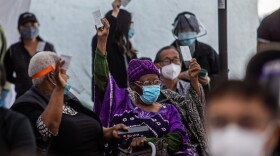
Yuki Noguchi
Yuki Noguchi is a correspondent on the Science Desk based out of NPR's headquarters in Washington, D.C. She started covering consumer health in the midst of the pandemic, reporting on everything from vaccination and racial inequities in access to health, to cancer care, obesity and mental health.
Since joining NPR in 2008, Noguchi has also covered a range of business and economic news, with a special focus on the workplace — anything that affects how and why we work. In recent years, she has covered the rise of the contract workforce, the #MeToo movement, the Great Recession and the subprime housing crisis. In 2011, she covered the earthquake and tsunami in her parents' native Japan. Her coverage of the impact of opioids on workers and their families won a 2019 Gracie Award and received First Place and Best In Show in the radio category from the National Headliner Awards. She also loves featuring offbeat topics, and has eaten insects in service of journalism.
Noguchi started her career as a reporter, then an editor, for The Washington Post.
Noguchi grew up in St. Louis, inflicts her cooking on her two boys and has a degree in history from Yale.
-
First, they were struck by illness and then by medical bills they couldn't pay. Here are 15 stories of Americans living under the shadow of health care debt.
-
With a fast-growing winter surge upon us, self-testing kits remain expensive and hard to find. The reasons go back to the approach the U.S. took from the outset in developing tests.
-
The Biden team wants to swiftly vaccinate people of color and others most vulnerable to COVID-19. But health centers are learning that speed and achieving racial equity don't always go hand in hand.
-
Early in the pandemic, shortages of N95 respirators and other medical gear prompted panic across the world. A year later, the masks still aren't widely available to U.S. consumers.
-
Young adults are preparing to travel home for Thanksgiving, but the coronavirus is making things complicated. Epidemiologists say there are things families can to do reduce the risk of infection.
-
There are dividing lines when it comes to how families are weathering the pandemic: Those living in big cities, those making less than $100,000 a year, and Latino and Black families are faring worst.
-
It's not that young adults aren't worried about the pandemic, psychologists say, but they are at far greater risk of dying by suicide. Finding ways beyond screens to foster social bonds is crucial.
-
Many people who have lost jobs during the pandemic are still awaiting unemployment checks and are figuring out which bills to prioritize. Experts share unusual advice for these unusual times.
-
A global shortage of face masks is prompting concern for the safety of health care workers. Now the U.S. government is trying to bring back an industry that largely left the country years ago.
-
Tales of life on a ship quarantined in Japan amid a coronavirus outbreak are hurting bookings for the growing cruise line industry. But the industry has shaken off worse crises, an analyst says.










